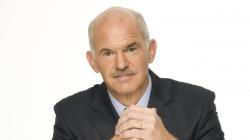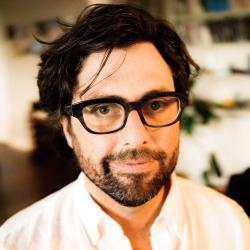The following essay comes from “Meaningful education in times of uncertainty,” a collection of essays from the Center for Universal Education and top thought leaders in the fields of learning, innovation, and technology.
 In the ancient world, Hermes was god of connection, communication, and movement. As the messenger among immortals, he could transcend the barriers between Olympus, Earth, and Hades. Always on the move and never settled, he was the deity of travel, crossings, and migration. Voyagers left pledges to him at the side of the road, asking for his good favor. Towns put his image on their gates. He guarded over the boundaries of city-states. God of trade, commerce, and contracts, Hermes was part of each diplomatic negotiation, watching over ambassadors and statesmen as they signed truces and came to agreements.
In the ancient world, Hermes was god of connection, communication, and movement. As the messenger among immortals, he could transcend the barriers between Olympus, Earth, and Hades. Always on the move and never settled, he was the deity of travel, crossings, and migration. Voyagers left pledges to him at the side of the road, asking for his good favor. Towns put his image on their gates. He guarded over the boundaries of city-states. God of trade, commerce, and contracts, Hermes was part of each diplomatic negotiation, watching over ambassadors and statesmen as they signed truces and came to agreements.
In the modern world, Hermes’ still moves at a dazzling pace. We live in times of increased connectivity and motion. New technologies represent just one instance of his “networking” mindset—a way of thinking that has led to globalization, worldwide economic interdependence, speedy transportation, more efficient energy grids, and unprecedented potential for communication. We are only at the beginning of what the World Economic Forum calls “the Fourth Industrial Revolution.” And as author Parag Khanna explains, we are still in “an early phase of reengineering the planet to facilitate surging flows of people, commodities, goods, data, and capital.”
We stand at a crossroads, ready to start a new journey; but our economic, political, and educational institutions will need to absorb massive changes and adapt quickly if we want our societies to remain cohesive and manageable.
Already, heightened worldwide technological and infrastructural connectivity has brought enormous cultural progress and economic growth. But it has also presented profound challenges. Consider, for example, climate change, cyber-crime, pandemics, inequality, and refugee movements. These civic problems are not isolated in nation-states; their origins and their consequences are globally connected. Likewise, commerce and capital are no longer geographically fixed; seventy-five percent of world trade now happens between countries that don’t even border on one another.
Our challenges are increasingly global and as a result, our local and national political institutions are becoming impotent. They are unable to manage the inevitable process of globalization. And therefore, the δῆμος (demos—as in, the people of a demo-cracy) becomes understandably frustrated and angered. Border walls and Brexits should be understood as part of a reactionary desire to disconnect, interrupt, and plug the porous pathways. But isolationists will be disappointed because this new nativism will not restore a sense of democratic control.
A recklessly optimistic acceptance of networked technologies is also not the answer. Popular narratives tell us that democratic solutions lay just beyond the horizon. Supposedly, new technologies will “disrupt” the existing power structures, creating a more “level” and “open” playing field. We’re told that more efficient innovations will democratize social, financial, and political edifices. But so far, the digital revolution only seems to be intensifying concentrations of wealth and influence. In the formative years of this new connected era, “sharing” and “crowdsourcing” business models are fortifying Libertarian monopolies and escalating socio-economic inequalities.
Meanwhile, political discourse seems to be ubiquitous. But it is becoming increasingly clear that today’s social media mostly just offers an outlet through which to let off steam. True influence remains illusory; real online opportunities for people to participate in the development and implementation of concrete policies are rare, if existent at all. Greece has experimented with wiki-laws—publishing proposals for new laws and collecting feedback before bringing them to Parliament. But in most cases existing democratic institutions do not, cannot, or perhaps are not willing, to develop the digital tool shed that could enhance or ensure democratic deliberation. And even if they did, we should remember that participatory systems are superfluous without citizens who are prepared to use them.
Many people are not currently prepared to participate in a changing world. They lack not only access, but also the workplace skills and technical know-how. What’s more, few citizens and/or institutions have developed the intellectual frameworks necessary to re-orient themselves. And we all struggle to maintain adequate identity narratives—to voice our unique knowledge, beliefs, and value systems—in a rapid-fire, hyperlinked, and non-linear communications environment.
The result is disempowerment. History makes it clear that when the δῆμος (demos) is not sufficiently educated (often because of inequality, and constraints on their available time for public participation), discourse stumbles and therefore, democracy crumbles. Our collective prosperity, therefore, depends on humanity’s ability to prepare a generation of global citizens who have the access, wisdom, and skills needed to work productively, participate democratically, and live contentedly in networked ways.
Of course, this is not simply a technical issue. In fact, it is highly political. It involves preparing youth, not only to be economic resources that can bolster GDPs, but also to be thoughtful citizens who can imagine creative and ethical solutions for the new connected challenges we face. And this requires cultivating identity, a sense of belonging to a global δῆμος (demos). Today’s students all need a common base of shared values that can humanize Hermes’ global connectivity.
It is useful to remember that democracy only became possible, in the ancient world, when the concept of citizenship shifted from being part of a clan or an ethnicity to sharing common values. The rhetorician, Isocrates (436-338 B.C.), once said that being Greek means to partake in Greek education. And an adequate Greek education, at the time, prepared citizens with the values, intellectual frameworks, and habits-of-mind required to actively participate in the political system that shaped their lives and guaranteed their freedoms.
Freedom was always the foundation of democracy. After all, the ancient Athenians only extended the rights of citizenship to those who were free—not only from slavery, but also free from burdens such as high debt, lack of time, or incapacity to contribute to the economy. Unfortunately, slavery and human trafficking continue today in different forms. However, what has changed is the recognition that servitude and gender exclusion are injustices that must be combatted if democracy and human rights are to be universal. Certainly, we’ve made great progress, but we’ve yet to provide all the protection, services, institutions, and education needed to free all the world’s people from each and every “burden,” and therefore, to elevate them to the status of truly free global citizens.
Additionally, many people resist the concept of global citizenship because it seems to imply the existence a world state—governed democratically, across and beyond borders. Of course, such a state does not exist. And the current struggles within the European Union are evidence that issues around identity, inclusivity, homeland security, and economic autonomy can make such a prospect extraordinarily complicated. But that should not discourage us. Instead, it suggests that we need to envision new kinds of political “connections,” universal values that can define a humanized globalism and underpin collective citizenship, while also allowing space for maintaining separateness and appreciating difference.
For example, existing technologies could easily enable humanity to offer the first truly global citizenship. It could happen in a way that transcends place. For example, global passports might be extended, first, to those who are currently stateless: refugees and migrants. Documents provide legal status, but we all know that papers can easily become stigmatizing unless they are associated with clearly-articulated rights and responsibilities. So, what might such a global citizenship ultimately entail? What awareness and understanding of the world would applicants need to demonstrate? How would they be educated?
If Isocrates was correct, that an ancient Greek was a person with a Greek education, then a global citizen would need to have a global education. Therefore, in accordance with the U.N.’s Sustainable Development Goals (SDG 4 on Education), a global citizen would share common values, endorsing “sustainable lifestyles, human rights, gender equality, promotion of a culture of peace and non-violence.” They should also be equipped with the breadth of skills necessary to make valuable contributions to a global economy. They’d have an awareness and understanding of new tools that shape our world. Plus, agile and critical thinking skills would allow them to assimilate and adapt to change, leveraging the benefits while minimizing the liabilities of technological progress.
Most importantly, however, global citizenship needs to promote the concept of civic participation. Only an active member of the πόλις (polis) can be a good citizen for the κόσμος (cosmos). Therefore, folks must demonstrate a commitment to the rights and responsibilities within their regional, local, and national communities. Taking responsibility for one’s place-of-residence should be the basis of a global citizenship, not the other way around. It’s about more than just being a cosmopolitan elite.
In ancient Greece, Hestia was goddess of home and hearth; she represented “place-of-residence.” Everything that was stable, permanent, and geographically fixed belonged to the goddess. Hestia’s hearth served not only as oven, stove, and heat source at “the center of the domestic sphere,” wrote Jean-Pierre Vernant, the late great scholar of ancient mythology. But also, because it is “fixed in the ground, the circular hearth is the naval that ties the house to the earth.” Hestia binds people to place. She tethers folks to their homelands.
But oddly, it is Hermes, god of travel and crossings, who gives the home its threshold—his is the image posted on the gates. Why? Because Hermes and Hestia always build boundaries together. So much so that, according to Vernant, the sculptor Pheidias depicted Hermes and Hestia as a couple on the base of the enormous statue of Zeus at Olympia (one of the seven wonders of the ancient world). Their coupling showed citizens that borders are ultimately lines of connection—seams that affix us and thresholds for passage—more than they are marks of division.
Remember that Greece was already a globalized society at the time the statue was built (around 435 B.C.). Certainly, their globe was much smaller than ours, but they were making trade deals with foreigners wherever and whenever they could. Archeologists have found evidence of Mycenaean maritime routes as far west as the Atlantic coast, which means the ancients sailed north around the Iberian Peninsula (Spain). They exchanged wine, olive oil, and pottery for silver and tin from the places that we now call France and Great Britain. They sourced grain, gold, and copper from throughout the Mediterranean, including the Middle East and North Africa (MENA) region. They even imported animal hides, timber, and salt fish from the far reaches of the Black Sea, where Russia is now.
To deal with the anxieties of pre-Hellenic globalism, these ancient people developed a polytheistic religious system. They told stories of many powerful gods—interdependent deities with conflicting perspectives. Notice how the ancient mythology mimics the landscape: immortals are like Islands. They are never together, but always connected. The Olympians migrate across a sea of fables, arriving suddenly in a new story with little context or explanation. No wonder: in a culture of connection where new people with confusing values and customs arrive every day, the foundational thought system needs to reflect a spirit of openness and tolerance in the face of disorienting diversity.
Obviously, modern conflicts can’t be resolved using an ancient doctrine. But we must learn from the past. We can see that an education in global citizenship needs to point toward the underlying truth at the heart of Hermes’ and Hestia’s coupling: there is no escaping a global world, just as there’s no escaping a local one. Union and partition are always in a reciprocal relationship. Transience and stability are inextricably linked. Together they define what it means to be live in a connected world. Ultimately, an education in global citizenship prepares people to live with these immortal tensions and to devise the institutions that can guarantee human rights and ensure opportunities for democratic participation.





Commentary
Op-edAn ancient education for modern democracy and global citizenship
August 3, 2017